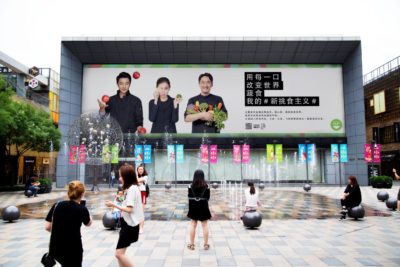
In a year when the global threat of climate change has made headlines, and evidence of its impact is all around us, WildAid has been working steadily to encourage a low-carbon, sustainable lifestyle across China.
With a population of 1.3 billion and a rapidly growing middle class, China is the world’s largest carbon dioxide emitter, producing more than the U.S. and EU combined. Chinese consumers are increasingly eating more meat, driving bigger cars, and heating larger homes. With these changes in lifestyle come severe costs in the form of climate and environmental impacts.
The stakes are high. Carbon emissions reached an all-time high in 2018, and a new report from the Intergovernmental Panel on Climate Change (IPCC) stresses the need to cap global warming to 1.5 degrees or face a significantly higher risk of drought, floods, extreme heat and poverty for hundreds of millions of people across the globe.
The report also emphasizes the importance of demand-side measures and the impact of individual lifestyle choices in this fight against climate change, noting technology and regulation alone will not be enough to stem this global catastrophe.
Seeing this as a critical intervention opportunity, WildAid has been at the forefront of international advocacy efforts to reduce individual greenhouse gas emissions in China for several years, while currently focusing on the high-impact areas of food choice and transportation. In 2018, we built upon our successful “Shu Shi” meat reduction campaign by launching two more billboards featuring popular Chinese actor Huang Xuan, which has resulted in more than 1.5 billion potential impressions from over 1,000 billboards and over 20,000 LED screens placed across seven major cities in China.
Likewise, our partnerships with Chinese businesses, including Tianjin Airlines, a national restaurant chain, and China’s most popular recipe website, have resulted in tens of millions of additional viewers learning about the climate and health impacts of meat consumption. These partners promote our campaign videos and messages to their customers as well as menu choices with less or no meat along with meatless recipes that can be downloaded.
To promote low-carbon transport in 2018, WildAid’s GOblue campaign launched an award-winning video PSA and billboard campaign with one of China’s hottest young pop stars and UNICEF ambassador Roy Wang. This PSA generated an estimated 250 million impressions across the nation and uses a fun, comic-based approach to promoting the efficiency of a car-free commute in China’s big cities. The accompanying comic-series billboards had over 115 million impressions across some of China’s biggest and most congested cities.
Our campaigns aim to encourage consumers to do their part in reducing emissions and global climate impacts. Behavior change and demand-side management can significantly reduce emissions, and help support a pathway to limiting warming so future generations can enjoy a healthy and green planet.
Stay in touch and get the latest WildAid updates.
SIGN UPAbout WildAid
WildAid is a non-profit organization with a mission to protect wildlife from illegal trade and other imminent threats. While most wildlife conservation groups focus on protecting animals from poaching, WildAid primarily works to reduce global consumption of wildlife products such as elephant ivory, rhino horn and shark fin soup. With an unrivaled portfolio of celebrity ambassadors and a global network of media partners, WildAid leverages more than $308 million in annual pro-bono media support with a simple message: When the Buying Stops, the Killing Can Too.
Journalists on deadline may email communications@wildaid.org


